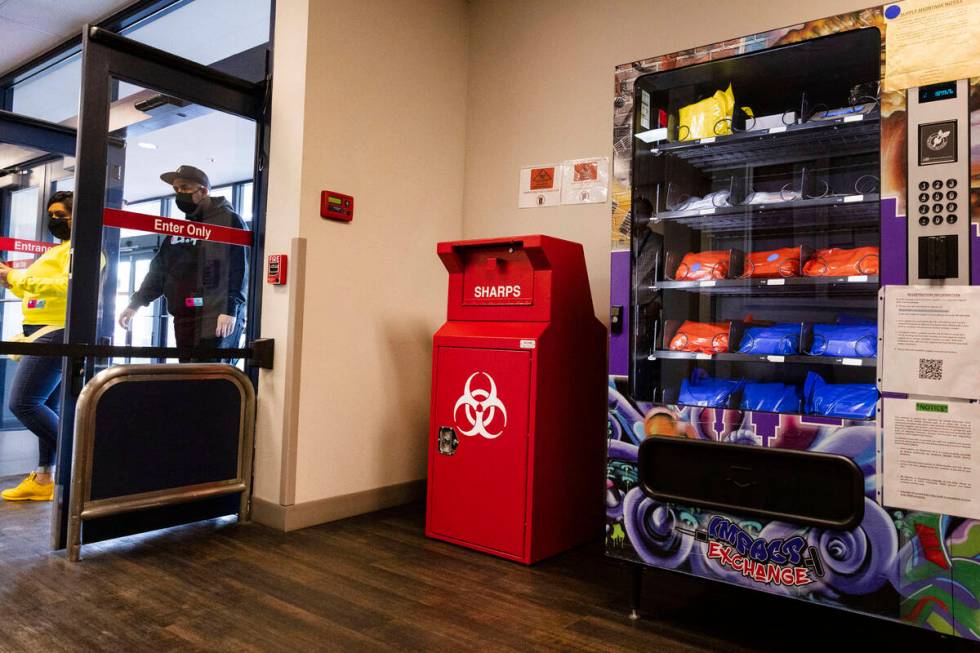Health district unveils needle-exchange vending machine

A vending machine dispensing free kits aimed at reducing the risk of HIV and hepatitis C and at treating opioid overdose was unveiled Monday at the headquarters of the Southern Nevada Health District.
The vending machine provides sterile syringe kits, hormone injection kits, hygiene kits, wound care kits, condoms, pregnancy tests and naloxone kits at no cost to clients.
Naloxone is a non-addictive, life-saving drug that can reverse the effects of an opioid overdose when administered in time. Seventy-five percent of nearly 92,000 drug overdose deaths in the U.S. in 2020 involved an opioid, according to the Centers for Disease Control and Prevention.
The sterile syringe kits include supplies such as cookers, used to mix and heat drugs, sterile water and tourniquets, said Jessica Johnson, a senior health educator with the district. The hormone-injection kits provide the supplies used by transgender people and other populations, such as bodybuilders, to inject hormones.
Providing these kits reduces the common practice of reusing needles and other supplies that spreads blood-borne diseases such as HIV and hepatitis C, Johnson said. She acknowledged that the kits are used to inject illicit drugs, including opioids.
“We recognize that things like illicit substance use and illicit use of hormones are just part of our world, and we work to reduce the risk associated with those types of behaviors,” Johnson said. “One of the key principles in harm reduction is pragmatism and realism.”
Today most people become infected with hepatitis C by sharing needles or other equipment used to prepare and inject drugs, the CDC said. Chronic hepatitis C can result in serious illness such as cirrhosis and liver cancer. People who inject drugs account for about one in 10 HIV diagnoses in the U.S., the federal agency said.
Nearly three decades of research indicates that needle-exchange programs reduce disease from blood-borne pathogens, Johnson said. It does not suggest that such programs encourage illicit drug use. However, the federal government since 1996 has prohibited the use of federal grant money for sterile syringes.
Federal grants pay for other components of the program, she said.
The new vending machine is located in the lobby of the health district’s main public health center at 280 S. Decatur Blvd. It is the seventh such machine in Southern Nevada.
Similar machines are located in addiction treatment centers, community centers and primary care clinics. The machines are operated by the Trac-B/Impact Exchange Harm Reduction Program, the Las Vegas Valley’s only syringe services program, the health district said.
The program has been well received in Southern Nevada, Johnson said, with some users connecting with services at the treatment centers where the vending machines are located.
The vending machine program was implemented through Nevada Senate Bill 410, effective in 2013. Syringe exchanges are used throughout the U.S., providing sterile needles and encouraging users to drop off used needles, which, Johnson said, reduces needle-stick injuries.
Nasal naloxone and fentanyl test strips continue to be available to the public at the health district’s Decatur Pharmacy. Self-administered HIV tests are available by mail via the Collect 2 Protect website at https://www.southernnevadahealthdistrict.org/programs/collect-2-protect/.
Contact Mary Hynes at mhynes@reviewjournal.com or 702-383-0336. Follow @MaryHynes1 on Twitter.